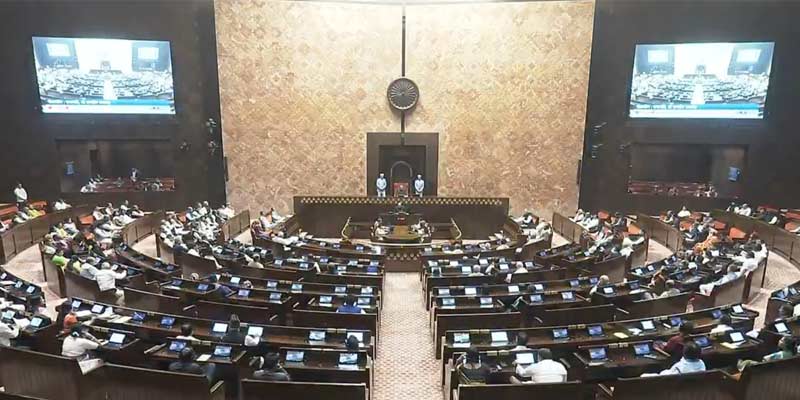- India
- Nov 25
What is Rule 267 in Rajya Sabha?
• Rajya Sabha proceedings were adjourned for the day as opposition parties led by the Congress tried to raise the issue of the indictment of Adani group founder chairman Gautam Adani and others in a US court on charges of paying bribes to secure solar power supply contracts.
• Earlier, Chairman Jagdeep Dhankhar disallowed 13 notices served under Rule 267, including seven that sought a discussion on the US indictment on the alleged payment of $265 million in bribes. But the Congress and Left parties insisted on a discussion, forcing a 15-minute adjournment of proceedings.
• Rule 267 of Rajya Sabha pertains to the suspension of a day’s business for taking up an issue.
• Soon after listed papers were laid on the table of the House and obituary references read out on the death of former MPs, Dhankhar said he had received 13 notices under rule 267 but was not convinced to accept them.
• The other notices under rule 267, which calls for suspending the listed business of the House to take up discussion on the issue being sought to be raised, pertained to continued violence in Manipur, violent clashes in Uttar Pradesh's Sambhal district and special assistance to the flood-hit Wayanad district of Kerala.
What is Rule 267?
• At times, there may arise situations when MPs seek to raise issues beyond the available tools depending upon the urgency of the matter. Envisaging such eventuality, Rule 267 has been provided in the Rules of Procedures and Conduct of Business in the Council of States (Rajya Sabha) to raise urgent issues of public importance by suspending normal operation of Rules.
• Rule 267 calls for setting aside business of the day to take up a discussion on the issue pressed.
It states that:
“Any member, may, with the consent of the Chairman, move that any rule may be suspended in its application to a motion related to the business listed before the Council of that day and if the motion is carried, the rule in question shall be suspended for the time being:
Provided further that this rule shall not apply where specific provision already exists for suspension of a rule under a particular chapter of the Rules.”
• The Chairman alone has the power to give consent for moving of a motion for suspension of a rule and it is for the House to decide whether a particular rule should be suspended or not.
• The primary objective of such a Motion is to draw the attention of the government to a matter of urgent public importance in regard to which a motion or a resolution with proper notice will be too late.
• Adoption of the Motion results in the suspension of the listed business and commencement of the discussion on the subject of the motion.
• Former Vice President M. Venkaiah Naidu had earlier noted that Rule 267 should be used on rare occasions as a “Brahmastra” for emergent or extraordinary situations. “If you start seeking recourse to Rule 267, you cannot run the House. It is very rarely used. It is like ‘Brahmastra’, which is used when other ‘astras’ weapons do not succeed,” he said.
• The Lok Sabha has a similar provision — the Adjournment Motion.
What is an Adjournment Motion?
• Adjournment Motion is the procedure for adjournment of the business of the House for the purpose of discussing a definite matter of urgent public importance, which can be moved with the consent of the Speaker.
• It needs the support of 50 members to be admitted.
• The primary objective of an Adjournment Motion is to draw the attention of the House to a recent matter of urgent public importance having serious consequences and with regard to which a motion or a resolution with proper notice will be too late.
• The Adjournment Motion, if admitted, leads to setting aside of the normal business of the House for discussing the matter mentioned in the motion.
• The discussion on an Adjournment Motion should last for not less than two hours and 30 minutes.
Manorama Yearbook app is now available on Google Play Store and iOS App Store

